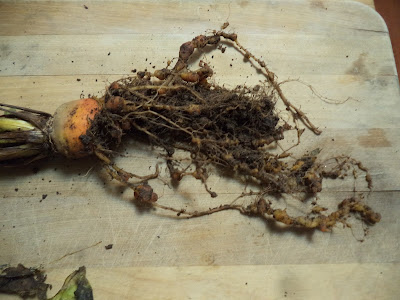 |
| Root knot nematode damage on a Grex beet. PHOTO/Amy W. |
It hadn't occurred to me that root knot nematodes would affect my winter beets, even though I know that my garden is occasionally troubled by these pests, but the knots on the beet (from a packet of 3-Root Grex) pictured here show that winter barely slowed them down.
It probably didn't help that November and December were so warm; the ground didn't get good and cold until around mid-January.
Really, having had three wet/rainy years in a row didn't help, either. Nematodes are less likely to proliferate in drier soils. It also doesn't help that I've been bad about keeping the weeds out this winter. According to the University of Arkansas publication "Control root-knot nematodes in your garden", "Root-knot nematodes also feed and multiply on many garden weeds, although they may not injure these plants to any extent."
Since this nematode problem is unlikely to just go away on its own, I have developed a plan to bring the population down to a less-horrifying level. I've already turned the soil in the affected bed, to remove weeds and expose more nematodes to the cold, drying air. In a week or so, I'll repeat that activity, and then again a week or two after that. Normally, I would not want to disturb the below-ground community so much, but these, apparently, are desperate times.
After the soil-turning series, I plan to plant collard and mustard greens just as thickly as I can, since their presence suppresses root-knot nematode populations. A week before spring planting, which will rely on as many nematode-resistant varieties as I can find, I'll turn under those greens.
This plan will not make the nematodes go away, and I may need to work out some additional strategies to keep the momentum going. A big component will be keeping the weeds out. Wish me luck!
The good news is that not all garden crops are troubled by root-knot nematodes, and, according to a publication about nematodes by the University of California IPM Program, not only will resistant varieties of crops produce in spite of showing some galling in the roots, "An additional benefit of growing a resistant variety is the nematode levels in the soil decline rather than increase..."
Sounds good to me!

Very helpful, Amy. Keep the info coming!
ReplyDeleteThe dream is that no one needs this particular bit of information, but the reality is that more gardeners need it than know they do.
DeleteI have spoken with people for whom some crops (squash family, mostly) do really well, but others (beans, tomatoes, especially) don't, and they didn't know that healthy roots don't have that knobby appearance, so they didn't know that these nematodes are causing the trouble.
"The literature" says that root knot nematodes are a bigger problem in sandy soils, but that doesn't mean we don't see their effects in the red clay soils where I live!